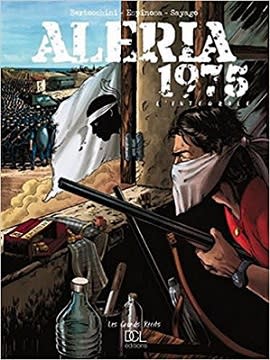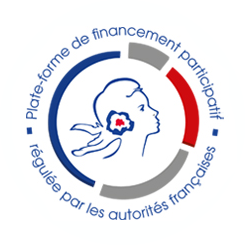Description
Synopsis
On August 21st, 1975, a few dozens of men armed with shotguns follow Edmond Simeoni in a wine cellar in Aleria, in the Eastern Plain of Corsica.
The Depeille cellar is suspected to be involved in a financial scandal.
In the early morning, the employees are peacefully evacuated and the activists invest the premises.
They draw graffiti on the walls, raise Corsican flags, barricade the windows and call the media. During the day, men and women from all Corsica join the ranks of the protesters.
In the evening, the phone lines are cut.
When the population start to worry, combat helicopters, a war ship, tanks and 1,200 police officers and general security officers are heading to Aleria.
A drama is about to happen…
The history of the movie
Our project is to bring a fiction feature to the screen about one of the biggest historical events of Corsica: the events of summer 1975 in Aleria.
We were inspired by the comic book “Aleria 1975” written by Frédéric Bertocchini and drawn by Michel Espinosa, which faithfully restores what happens during these two days of cellar occupation.
The authors relied on real testimonies to give a reconstitution as faithful to the reality as possible.
It is now all the more valuable because it revealed up to now unprecedented and unknown facts. They succeeded in transcribing the atmosphere and the stakes of that moment. The rhythm is also very interesting.
The comic book is then an excellent base material on which to rely.

For its part, the movie will try to further the characters and their emotions to give them more dimension and depth.
We want to enhance the human side of such a story.
To do so, in addition to a significant documentation work, we met again these men and women who lived these two historic days.
They were excited about the idea of transcribing this story for the theater and agreed to engage more personally in the subject.
These interviews were inspirational to enrich and develop the characterization of the movie’s characters, their interactions and feelings.
This adaptation is even more welcomed with the recent events and the current context (democratic victory of an elected nationalist party for the Corsican Assembly, will of progressive demilitarization by the clandestine fighters), a reminder of the fundamentals isn’t nonsense.
Like the comic book, this movie can be intended to increase young people awareness of this event which represented the awakening of the Corsican society to its conditions and also to enlighten a less informed audience (continental, foreigners) about the reasons of the antagonism between the French authorities and the Corsican population.
The MOVIE’S ARGUMENT
Like the comic book, the movie will take a narrative side toward the besieged characters.
The notion of confinement is essential.
Almost the whole story is happening inside the cellar.
The impression of confinement allows to implement a stress which rise all along the movie. The spectator will have the impression to be trapped in this cellar with the protestors and the feeling of immersion and compassion for the characters will be increased.
But the other perspective mustn’t be left aside.
In order to stay objective, the perspective of the police shall also be exposed.
We have to understand the reasons that drives each side. One isn’t more wrong than the other.
Indeed, those who are responsible for the dramatic ending of this case weren’t there, in Aleria, but elsewhere (Place Beauvau).
It is hard not to be seduced by the idea as this event can be the subject of a movie.
Some surrealist but genuine scenes are worth a Hollywood movie (the confrontation between the police and the commando with the fake hostages, the assault which ends in blood, the protestors who leave the cellar by forcing the police barricade with a truck, etc.)
A feature between the Mediterranean western and the political thriller.
The Authors
Frédéric Bertocchini
Born on October 2nd, 1973 in Ajaccio
Since 1992, Frédéric Bertocchini is journalist for the Corsican radio Alta Frequenza.
History aficionado, he also writes comic books and many of his book refers to the History of Corsica: Paoli (3 volumes), Sampiero Corso (2 volumes), Aio Zitelli! War stories 14-18 (2 volumes), Libera me (3 volumes) …
Most importantly he is the writer of the comic book series in two volumes Aleria 1975.
Michè D’Onofrio
Born on July 21st, 1990 in Ajaccio.
Michè D’Onofrio, director, studied cinema in Corti at the IUT of Corsica, where he wrote and directed his first short feature as part of his training: Libertà per I scemi! (fiction) and Peppu Fiori, L’Anima d’una cultura (documentary).
The following year, he directed a second fiction short-feature, Tutt’in casa cumuna!, coproduced by the Group of Film Research and Trial.
Co-writer of ALERIA 1975
Jean-François Perrone
Born on May 10th, 1967 in Portivechju.
Professional actor since July 1994 and stage director, Jean-François Perrone is as experienced in theaters (Ben Hur, directed by Robert Hossein, general show at the Stade de France) as on TV (Mafiosa, Engrenages, Les Héritières) and on the big screen (L’Enquète Corse, Il était une fois dans l’Ouest de la Corse, Vive la France).
Co-writer of ALERIA 1975.
Describe your project goal
Why crowdfunding ?
The film directing is expensive and hard, especially when it’s about directing powerful and realistic fiction feature.
Even if many partners help or want to help us, we still don’t have the necessary funds to direct this movie.
More than simple general rewards, we want to make you share the experience and the atmosphere of the movie in multiple ways: invitations to take part in the shooting, customized T-shirts, etc.


 by Aleria 1975
(Porto - Vecchio)
by Aleria 1975
(Porto - Vecchio)








